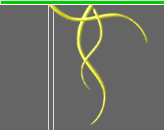| |
Nettle (Urtica dioica, Urtica urens)
Stinging nettle (Urtica dioica and the closely related Urtica urens) has a long medicinal history. In medieval Europe, it was used as a diuretic (to rid the body of excess water) and to treat joint pain.
Stinging nettle has fine hairs on the leaves and stems that contain irritating chemicals that are released when the plant comes in contact with the skin. While the hairs, or spines, of the stinging nettle are normally very painful to the touch, when they come into contact with a painful area of the body, they can actually decrease the original pain. Scientists think nettle does this by reducing levels of inflammatory chemicals in the body, and by interfering with the way the body transmits pain signals.
General Uses
Stinging nettle has been used for hundreds of years to treat painful muscles and joints, eczema, arthritis, gout, and anemia. Today, many people use it to treat urinary problems during the early stages of an enlarged prostate (called benign prostatic hyperplasia or BPH), for urinary tract infections, for hay fever (allergic rhinitis), or in compresses or creams for treating joint pain, sprains and strains, tendonitis, and insect bites.
As food, this tonic is good for rebuilding the system of chronically ill people. Nineteenth century literature is full of so-called constitutionally weak people, who usually die on the last page. In Russia, they were given freshly squeezed nettle juiceóa tonic loaded with iron and other nutrientsófor iron-deficiency anemia. This often worked.
Many of the benefits are due to the plant's very high levels of minerals, especially, calcium, magnesium, iron, potassium, phosphorous, manganese, silica, iodine, silicon, sodium, and sulfur. They also provide chlorophyll and tannin, and they're a good source of vitamin C, beta-carotene, and B complex vitamins. Nettles also have high levels of easily absorbable amino acids. They're ten percent protein, more than any other vegetable.
As an expectorant, it's recommended for asthma, mucus conditions of the lungs, and chronic coughs. Nettle tincture is also used for flu, colds, bronchitis and pneumonia.
Nettle tea compress or finely powdered dried nettles are also good for wounds, cuts, stings, and burns. The infusion was also used internally to stop excessive menstruation, bleeding from hemorrhages, bloody coughs, nose bleeds, and bloody urine. It helps blood clot, but major bleeding is dangerousóindicative of a serious underlying condition. Consult a competent practitioner in such cases. Use for minor cuts.
Nettle tea compress or finely powdered dried nettles are also good for wounds, cuts, stings, and burns. The infusion was also used internally to stop excessive menstruation, bleeding from hemorrhages, bloody coughs, nose bleeds, and bloody urine. It helps blood clot, but major bleeding is dangerousóindicative of a serious underlying condition. Consult a competent practitioner in such cases. Use for minor cuts.
Eating nettles or drinking the tea makes your hair brighter, thicker and shinier, and makes your skin clearer and healthierógood for eczema and other skin conditions. Hair- and skin care products often list stinging nettle as an ingredient. Nettles have cleansing and antiseptic properties, so the tea is also good in facial steams and rinses.
The nettle herb is good for oily skin and has cleansing, clarifying, and emollient properties. It is also suitable for sensitive skin. It is useful for treating and preventing dandruff.
Nettle also takes care of fungal and bacterial infections of the scalp, skin and even nails. Wash your face with nettle leaf infusion to check acne.
Nettle is very beneficial herb that can be used to nourish hair, encouraging natural growth, soothes irritated scalp, strengthens the hair shaft, and fortifies root growth.
The herb is very rich in Vitamins A, C, and E, Vitamin D and Vitamin K. It also provides an excellent source of calcium and iron. Nettles are also full of silica (in a readily absorbable form) an extremely important mineral for cell rejuvenation.
Silica is an essential mineral for healthy hair, skin and teeth and to protect against baldness, infection, poor vision, mental fatigue and nervous exhaustion.
It is vital in the formation of healthy red blood cells and blood circulation.
Nettle is a richly abundant source of antioxidants.
Antioxidants are important to protect the body from free radical damage. There is overwhelming research evidence that high levels of antioxidants slow the ageing process.
Nettle is a supreme herb for its rich mineral content: calcium and magnesium; phosphorous; sulphur; copper; and silica (in a readily absorbable form) and potassium that combines with iron to transport oxygen to the cells, and elimination of toxic wastes.
Nettle leaf wash or infusion is also anti-septic, so use it on minor wounds, cuts, heat rash or burns on the skin for quick healing.
Return to Information Library
Disclaimer:
The information presented herein is intended for educational purposes only. These statements have not been evaluated by the FDA and are not intended to diagnose, cure, treat or prevent disease. Individual results may vary, and before using any supplements, it is always advisable to consult with your own health care provider.
|














